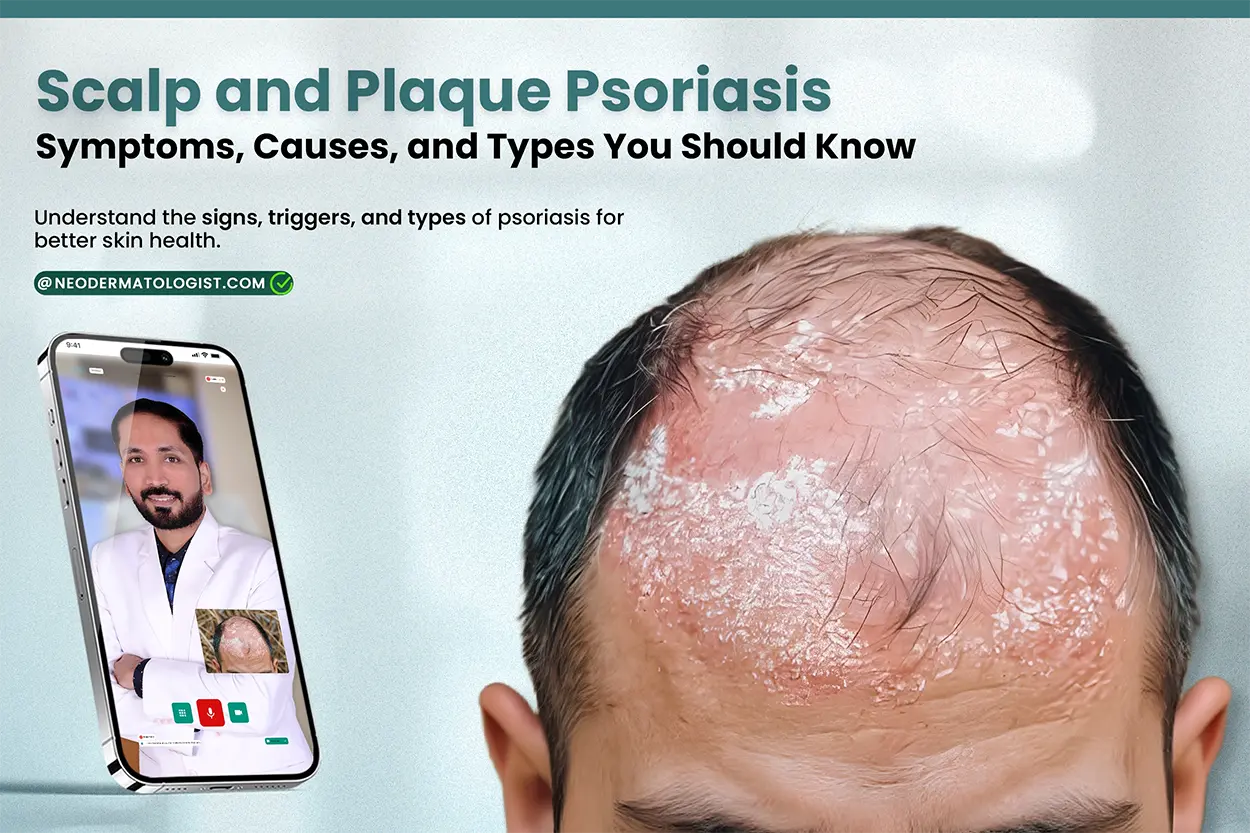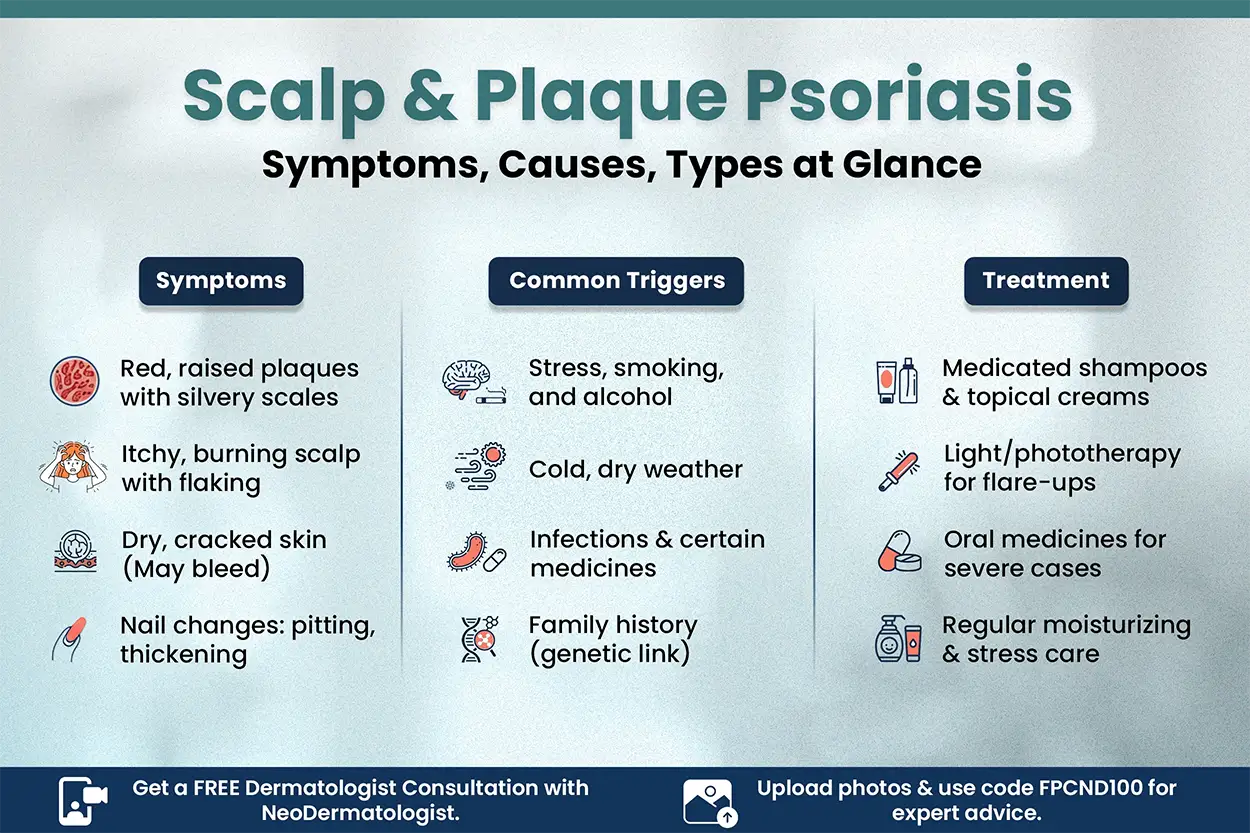
Scalp vs Plaque Psoriasis: Symptoms, Causes, Types, Pictures & Treatment
Introduction
Hello everyone, I’m Dr. Karma Patel, a dermatologist with a special focus on treating psoriasis and other chronic skin conditions through both in-clinic and online consultations. Over the years, I have guided and consulted many patients through our Online Plaque & Scalp Psoriasis Treatment program - two of the most common yet often misunderstood forms of this disease.
One of the frequent questions patients ask me is:
“What exactly causes psoriasis, and how do I know which type I have?”
The answer is not always simple - psoriasis can be triggered by genetics, lifestyle, environmental changes, and even stress. Its symptoms may appear similar but vary depending on the type.
Psoriasis is a chronic inflammatory skin condition that affects millions worldwide. Among its different forms, scalp psoriasis and plaque psoriasis are the most common and often misunderstood. If you are struggling with persistent itching, scaling, or red patches, this guide will help you understand the psoriasis symptoms, causes, and types in detail.
In this blog, we will cover:
- What psoriasis really is
- The most common psoriasis symptoms to watch out for
- Key causes and triggers of psoriasis
- Different types of psoriasis, including scalp and plaque psoriasis
- How timely treatment can improve the quality of life
Let’s begin by understanding this complex skin condition in detail.
What Is Scalp and Plaque Psoriasis?
What is Psoriasis?
Psoriasis is a long-term autoimmune skin disease where the body’s immune system speeds up the skin cell cycle, leading to the buildup of thick, scaly patches. These patches are often itchy, inflamed, and can occur anywhere on the body.
Common sites include the scalp, elbows, knees, and lower back, but psoriasis can also affect nails and joints.
Psoriasis Symptoms You Should Watch For
The symptoms of psoriasis vary depending on the type and severity, but the most common include:
- Itching and burning sensation
- White or silvery scaling over red patches
- Erythema (redness of the skin)
- Dryness and flaking (especially in psoriasis symptoms on the scalp)
- Cracks that may bleed in severe cases
Plaque psoriasis symptoms are usually thick, raised, and scaly patches, while scalp psoriasis symptoms often include persistent dandruff-like scaling that does not improve with regular anti-dandruff shampoos.
Clinical Features of Psoriasis
Dermatologists diagnose psoriasis by observing specific signs on the skin, scalp, nails, and even joints. These clinical features help distinguish psoriasis from other skin conditions like eczema or fungal infections.
- Sharply demarcated plaques - well-defined raised patches that differ from surrounding normal skin.
- Silvery-white scales - thick, dry, flaky scales covering the lesions, most prominent on the scalp, elbows, and knees.
- Auspitz sign - tiny pinpoint bleeding spots when scales are gently scraped off.
- Koebner phenomenon - appearance of new lesions on previously healthy skin after trauma or scratching.
- Nail changes - pitting (small depressions), onycholysis (nail lifting), thickened nails, and discoloration.
- Pruritus and burning - itching and irritation are common, although severity varies among patients.
- Psoriatic arthritis - in some patients, joint pain, stiffness, and swelling may occur.
Clinical Spectrum of Psoriasis (Table Form)
| Feature | Description | Clinical Importance |
Lesion morphology | Raised, erythematous (red) plaques with sharp borders | Helps distinguish psoriasis from eczema or fungal infections |
| Scalling | Dry, silvery-white, adherent scales on plaques | Characteristic hallmark, often first noticed by patients |
| Distribution | Common on scalp, elbows, knees, lower back; symmetrical pattern | Guides diagnosis - symmetrical spread is typical in psoriasis |
| Nail Involvement | Pitting, oil-drop sign, thickening, onycholysis | Seen in up to 50% cases, may precede skin lesions |
| Koebner Phenomenon | New lesions developing after trauma (cuts, burns, scratches) | Indicates disease activity and severity |
| Systemic Involvement | Joint pain, stiffness, fatigue (psoriatic arthritis) | Helps identify psoriatic arthritis early to prevent joint damage |
| Seasonal Variation | Often worsens in winter and improves with sun exposure | Useful for patient counseling and treatment planning |

Scalp Psoriasis vs Plaque Psoriasis
| Feature | Scalp Psoriasis | Plaque Psoriasis |
| Location | Scalp, hairline, behind ears | Elbows, knees, scalp, back |
| Appearance | Red patches with thick scaling | Raised red plaques with silvery scales |
| Hair loss | Temporary (due to inflammation) | Rare |
| Common confusion | Dandruff, ringworm | Eczema, fungal infection |
Psoriasis vs Ringworm: How to Tell the Difference
- Psoriasis is an autoimmune
- Ringworm is fungal
- Ringworm spreads
- Psoriasis does not
Ringworm is a fungal skin infection, and understanding what causes ringworm is essential for accurate diagnosis and effective treatment. Ringworm causes are mainly linked to dermatophyte fungi that spread through direct skin contact, contaminated surfaces, or infected pets. To learn more about ringworm caused by fungi and common risk factors, read our detailed guide on"Ringworm Causes: What Is Ringworm Caused By on Skin?"
If you are unsure whether your scalp condition is psoriasis or a fungal infection, consulting a certified dermatologist early can prevent worsening symptoms and hair loss.
Psoriasis Causes and Triggering Factors
While the exact causes of psoriasis are not fully known, research shows a combination of genetic, immune, and environmental factors.
Major triggers include:
- Genetic factors - family history of psoriasis
- Environmental factors - cold, dry weather
- Cutaneous trauma - physical injury, chemical irritation, allergic reactions
- Lifestyle habits -smoking and alcohol worsen psoriasis
- Infections - especially throat infections can trigger guttate psoriasis
- Stress - a major aggravating factor
- Seasonal variations - symptoms worsen in winter, improve in summer
- Pregnancy - hormonal changes may alter psoriasis course
- Certain medications - such as beta-blockers, lithium, and antimalarials
If you are facing persistent scalp psoriasis caused by stress, lifestyle, or seasonal triggers, consulting a dermatologist is crucial.
Types of Psoriasis You Should Know
Psoriasis is not a single disease but a group of related conditions that affect the skin in different ways. Each type has unique features, triggers, and treatment approaches. Understanding the subtypes is essential for accurate diagnosis and proper management.
1. Guttate Psoriasis
- Appearance: Small, drop-shaped red or pink spots on the skin.
- Common in: Children and young adults.
- Trigger: Often develops after streptococcal throat infections or viral illnesses.
- Sites: Trunk, arms, legs.
- Course: May clear within weeks but can sometimes progress to chronic plaque psoriasis.
2. Chronic Plaque Psoriasis
- Appearance: Thick, well-defined, red plaques with silvery-white scales.
- Common in: Adults, most prevalent type (accounts for 80–90% of cases).
- Sites: Elbows, knees, lower back, scalp.
- Course: Long-lasting, with flare-ups and remissions.
3. Elephantine Psoriasis
- Appearance: Very large, thick plaques covering extensive skin areas.
- Symptoms: Pain, cracking, bleeding due to excessive thickness.
- Impact: Severe disability and cosmetic concern.
4. Exfoliative Psoriasis
- Appearance: Widespread redness, scaling, and peeling of the skin.
- Seriousness: Can be life-threatening if untreated due to fluid loss, infection, and temperature imbalance.
- Requires: Urgent medical attention.
5. Palmoplantar Psoriasis
- Appearance: Red, scaly, and sometimes cracked patches on palms and soles.
- Symptoms: Painful, disabling, may interfere with walking and using hands.
- Often mistaken for: Eczema or fungal infection.
6. Pustular Psoriasis
- Appearance: White pustules (pus-filled bumps) on inflamed, red skin.
- Types: Localized (palms/soles) or generalized (serious and requires hospitalization).
- Symptoms: Fever, chills, fatigue, along with skin lesions.
7. Annular Generalized Psoriasis
- Appearance: Ring-shaped lesions with clear centers.
- Sites: Can appear anywhere on the body.
- Course: Chronic but often responsive to treatment.
8. Scalp Psoriasis
- Appearance: Thick scaling, redness, and persistent dandruff-like flakes.
- Symptoms: Itching, soreness, sometimes temporary hair loss.
- Often confused with: Seborrheic dermatitis (dandruff).
9. Psoriatic Arthritis
- Appearance: Joint pain, swelling, and stiffness, combined with psoriasis skin lesions.
- Risk: Can lead to permanent joint damage if untreated.
- Sites: Fingers, toes, knees, lower back.
Many people search online for “psoriasis types with pictures” to compare their condition, but only a dermatologist can provide a reliable diagnosis and treatment plan. So, if you're looking for the Plaque & Scalp Psoriasis Treatment Specialist, and want to start your treatment as soon as possible with a NeoDermatologist.com: Your Trusted Online Dermatologist Consultation Platform.
Psoriasis Treatment for Scalp and Plaque Psoriasis
Although there is no permanent cure for psoriasis, several treatments can control symptoms, reduce flare-ups, and improve quality of life. Treatment choice depends on severity, type of psoriasis, and patient lifestyle.
1. Topical Treatments
- Medicated shampoos: Containing coal tar, ketoconazole, or salicylic acid to reduce scalp scaling.
- Topical corticosteroids: Reduce inflammation and itching.
- Vitamin D analogs (calcipotriol): Help slow skin cell growth.
- Moisturizers: Prevent dryness and reduce scaling.
2. Phototherapy (Light Therapy)
- Narrowband UVB light therapy: Slows down skin cell turnover.
- Excimer laser: Targets localized areas of plaque psoriasis.
- Best for patients who don’t respond to topical therapy.
3. Systemic Medications (for moderate to severe cases)
- Methotrexate: Reduces skin cell production and suppresses inflammation.
- Cyclosporine: Powerful immune suppressant, short-term use.
- Acitretin: An oral retinoid for resistant cases.
- Biologic agents (e.g., adalimumab, secukinumab): Target specific immune pathways, highly effective but costly.
4. Lifestyle & Self-Care
- Stress management: Stress is a major trigger; yoga, meditation, or therapy can help.
- Avoid triggers: Alcohol, smoking, certain medications, and infections.
- Maintain scalp hygiene: Regular shampooing with medicated products.
- Moisturize regularly: To prevent dryness and flares.
- Dietary care: Some patients notice improvement with anti-inflammatory diets (omega-3 rich foods, reduced sugar/oily foods).
Why Choose a Neodermatologist For Online Consultation?
Skin issues like psoriasis can often be influenced by lifestyle, diet, and personal triggers. Instead of relying on trial and error, consult with a dermatologist for the right guidance.
With NeoDermatologist’s Online Services, you can:
- Free Photo Consultation - Upload your photos and get a personalized prescription, no video call needed.
- Video Consultation - Talk directly with a dermatologist about your symptoms, diet, and treatment options.
- Instant Support - Chat anytime with SkinMate, our AI-powered Dermatology Nurse, on WhatsApp for quick answers about skin conditions and treatments.
So now, Book Your Consultation On Whatsapp At: +91 70 69 100 072
Use Code: FPCND100 to claim a FREE photo consultation today.
Click on the link to know more about our Free Online Dermatologist Consultation for Skin and Hair.
Also explore our online dermatologist treatment services for Hair Loss, Vitiligo, Scabies, Urticaria, Ringworm Treatment, eczema, jock itch, acne or pimple, and more.
Conclusion
Living with scalp or plaque psoriasis can be physically uncomfortable and emotionally challenging, but with proper care, it is manageable. If you notice persistent redness, itching, scaling, or thick plaques on your head or scalp, don’t delay treatment. Timely consultation with a dermatologist for specialized scalp psoriasis treatment can make a major difference. With the right treatment plan, most patients experience long-term relief, improved skin health, and a better quality of life.
Thank You.
MD (Dermatology) | Registration No.: G-53014
A dermatologist specializing in online consultations for skin, hair, and nail concerns. Offers expert care for acne, pigmentation, eczema, scabies, ringworm, scalp infections, dandruff, psoriasis, vitiligo, hives, and hair loss, providing effective, personalized treatment solutions from the comfort of home.
 Hin
Hin En
En





















Comments
Aditi Rajput
This article is very informative and well explained. I learned a lot about the symptoms, causes, and types of scalp and plaque psoriasis. It helped me understand why my itching and scaling keep coming back and why proper dermatology treatment is important instead of home remedies. Really useful read for anyone facing similar issues.
Aarya Sanghvi
यह ब्लॉग स्कैल्प और प्लाक सोरायसिस के बारे में बहुत ही जानकारीपूर्ण और उपयोगी है। इसमें लक्षण, कारण और प्रकारों को आसान और समझने योग्य भाषा में अच्छे से समझाया गया है। जो लोग लंबे समय से सोरायसिस की समस्या से जूझ रहे हैं, उनके लिए यह लेख काफी मददगार है। Neodermatologist द्वारा दी गई जानकारी भरोसेमंद और प्रैक्टिकल लगती है। बहुत अच्छा लेख, ऐसे ही जागरूकता बढ़ाने वाला कंटेंट साझा करते रहें।
Yash Rana
This answered a lot of my doubts. This is a very informative and well-written article - thank you for breaking down the symptoms, causes, and types of both scalp and plaque psoriasis so clearly. I especially appreciated the way you distinguished how they differ and overlap.
Palak Trivedi
Thank you for this thorough write-up on scalp and plaque psoriasis! I really found the explanations of the various types and their causes to be quite helpful. One aspect I particularly appreciated was how you outlined the symptoms to keep an eye on. It's so important to know what to look for early on so you can get treatment sooner rather than later.
Post a comment